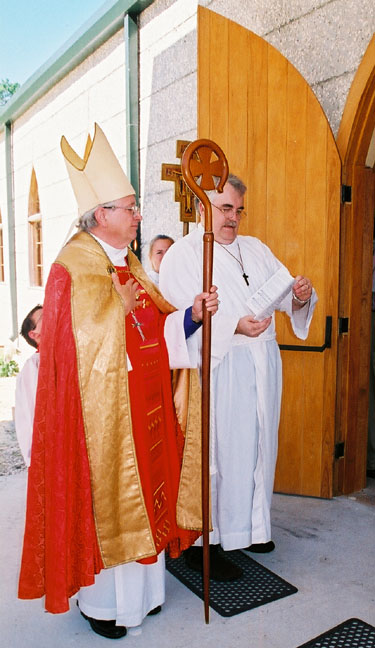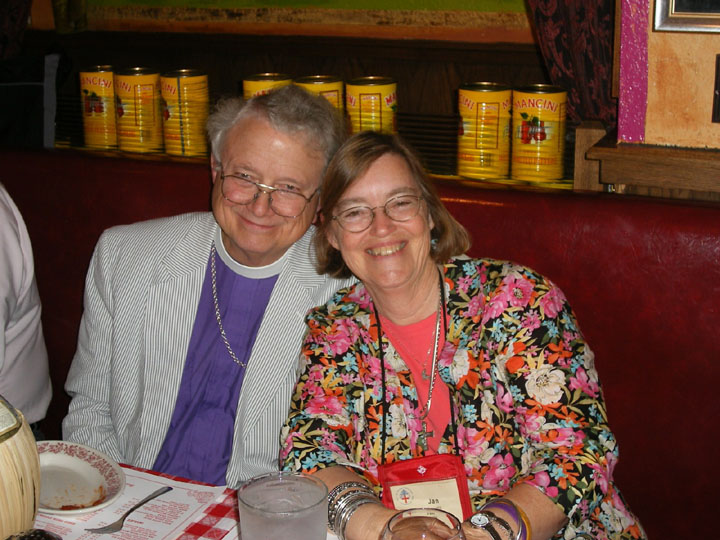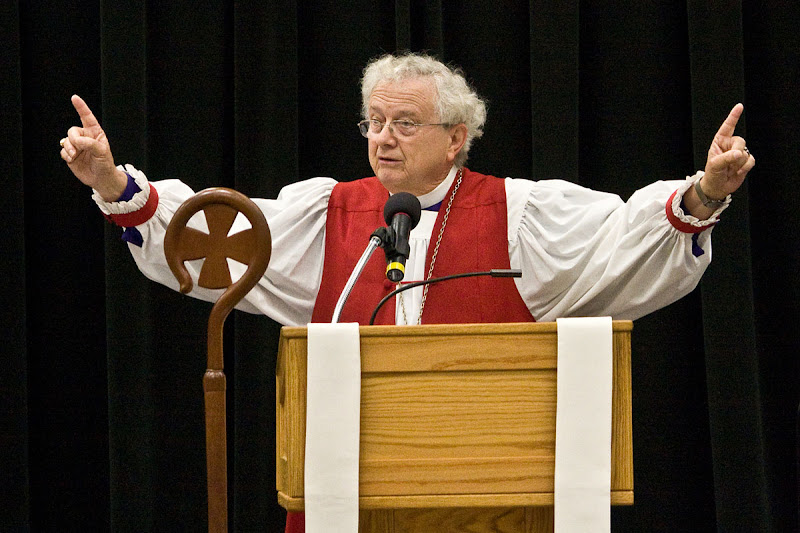The Episcopacy of the Right Reverend Henry Irving Louttit, Jr.
Ninth Bishop of Georgia
Written by the Rt. Rev. Harry W. Shipps
 Bishop Louttit was born in West Palm Beach, FL on 13 June 1938, son of Bishop and Mrs. H. I. Louttit, Sr. Married in 1962, he and his wife Jan have three children. His undergraduate degree is from The University of the South and he graduated from Virginia Theological Seminary in 1963. He was ordained deacon by his father, then Bishop of South Florida, and priest the following year by Bishop Albert R. Stuart, then Bishop of Georgia. He served Trinity Church, Statesboro, GA, and in 1967 became Rector of Christ Church, Valdosta, where he remained until election as bishop in 1994, elected from the Diocese of Georgia, as was his predecessor. He was consecrated bishop 21 January 1995 in the Roman Catholic Cathedral of St. John the Baptist, Savannah, GA. Presiding Bishop Edmund L. Browning, chief consecrator, was assisted by co-consecrators Bishops H. W. Shipps and L.B. Shirley. Bishop Shipps transferred diocesan authority by presenting the pastoral staff to Bishop Louttit at the conclusion of the service. Bishop Louttit is pictured here with his father, the Rt. Rev. Henry I. Louttit, Sr., on the younger Louttit’s ordination to the priesthood.
Bishop Louttit was born in West Palm Beach, FL on 13 June 1938, son of Bishop and Mrs. H. I. Louttit, Sr. Married in 1962, he and his wife Jan have three children. His undergraduate degree is from The University of the South and he graduated from Virginia Theological Seminary in 1963. He was ordained deacon by his father, then Bishop of South Florida, and priest the following year by Bishop Albert R. Stuart, then Bishop of Georgia. He served Trinity Church, Statesboro, GA, and in 1967 became Rector of Christ Church, Valdosta, where he remained until election as bishop in 1994, elected from the Diocese of Georgia, as was his predecessor. He was consecrated bishop 21 January 1995 in the Roman Catholic Cathedral of St. John the Baptist, Savannah, GA. Presiding Bishop Edmund L. Browning, chief consecrator, was assisted by co-consecrators Bishops H. W. Shipps and L.B. Shirley. Bishop Shipps transferred diocesan authority by presenting the pastoral staff to Bishop Louttit at the conclusion of the service. Bishop Louttit is pictured here with his father, the Rt. Rev. Henry I. Louttit, Sr., on the younger Louttit’s ordination to the priesthood.
In his first address as bishop to Diocesan Convention, Bishop Louttit stated he believed the ministry of the bishop to be: an encourager, friend, and prayer supporter; the link between congregations in our diocese, throughout the world, and back through time to the apostles; the chief administrator, planner, and visioner; trouble-shooter, and reconciler; the sharer of family stories, like the grandfather of the family; an icon model of Christian service. He commended nine congregations for giving 100% of their Asking. Bishop Louttit believes that through our Baptism, God has given us in this diocese sixteen thousand baptized persons with incredible skills, gifts, and talents for ministry.
Deciding the Diocesan Council could be more effective if re-structured, Bishop Louttit asked Council to work in four groups: organization and stewardship, communications, support and ministry of the Baptized, congregational development. He terminated the role of St. Paul’s Savannah as pro-Cathedral of the diocese, saying he felt emotionally attached to the Honey Creek Chapel of Our Savior as his unofficial cathedral. He maintained The Very Rev’d J. Robert Carter as Canon to the Ordinary. Long involved in liturgical renewal of the Episcopal Church, the bishop also had served a term as President of the Georgia Christian Council. He attended the Lambeth Conferences of 1998 and 2008 in Canterbury, England.
Bishop Louttit’s convention addresses focused on evangelism and church growth, conveying a firm concept of the ministry of “all the baptized” and “mutual ministry”. He ministered pastorally to the people of the diocese during a time of continuing change and dissent in the life of The Episcopal Church, speaking frequently in meetings and in his convention address of the need for tolerance of a variety of theological positions. His vision was for all congregations to reflect the composition of the communities they serve, noting that 60 of our 67 parishes and missions have persons of different races in their congregation at worship. He regularly pointed out that our life together as a diocese and as a Church involves active ministry of all the baptized.
 The bishop promoted congregational development, worked for expansion and stabilization of diocesan missions, and sought locations for new missions. King of Peace was established in Kingsland, St. Luke’s in Rincon, and in Evans County, Holy Comforter was established from St. Paul’s, Augusta. A mission congregation, Our Savior, met in Honey Creek, with utilization of the chapel. A Lee County mission eventually failed. A gift of $500,000 enabled St. Luke’s, Hawkinsville to become a parish. The dedication of King of Peace, Kingsland, is pictured here.
The bishop promoted congregational development, worked for expansion and stabilization of diocesan missions, and sought locations for new missions. King of Peace was established in Kingsland, St. Luke’s in Rincon, and in Evans County, Holy Comforter was established from St. Paul’s, Augusta. A mission congregation, Our Savior, met in Honey Creek, with utilization of the chapel. A Lee County mission eventually failed. A gift of $500,000 enabled St. Luke’s, Hawkinsville to become a parish. The dedication of King of Peace, Kingsland, is pictured here.
In order that congregations which could not support a full-time priest would have the Eucharist every Sunday, Bishop Louttit initiated the training and formation of persons locally for ordination as priests and bi-vocational priests, without seminary degree, based on Canon 9 of the national Canons. The number of ‘locally trained’ Canon 9 clergy increased greatly in the diocese during his episcopate. Candidates for vocational diaconate normally receive training under supervision of the Diocesan Commission on Ministry. Believing there should be at least one vocational deacon in every parish and mission, Bishop Louttit ordained many; eventually he ordained a number of these deacons to the priesthood.
 Bishop Louttit strongly supported Cursillo and Happening events at Honey Creek and Kairos weekends in state prisons. He had a keen interest in Eastern Orthodox sacred art, and commissioned four icons of clergy who had significant ministries early in the history of the diocese for the diocesan office chapel. Bishop and Jan Louttit are pictured here at a dinner during the 2006 General Convention.
Bishop Louttit strongly supported Cursillo and Happening events at Honey Creek and Kairos weekends in state prisons. He had a keen interest in Eastern Orthodox sacred art, and commissioned four icons of clergy who had significant ministries early in the history of the diocese for the diocesan office chapel. Bishop and Jan Louttit are pictured here at a dinner during the 2006 General Convention.
In 2001 he and the Companion Diocese Committee recommended establishment of a Companion Diocese relationship with the Diocese of the Dominican Republic, the third such relationship for the Diocese of Georgia, Guiana and Belize being the previous two.
Bishop Louttit strove to keep the diocese united during a period of great controversy following the ordination of Bishop Gene Robinson in New Hampshire, a partnered homosexual. During his episcopate, in two congregations only, St.Thomas, Thomasville, and Christ Church Savannah, did some members leave the Episcopal Church to begin new congregations. A group in St. Thomas became unsettled with what they perceived as the liberal direction in which the Episcopal Church was moving, and about half the congregation broke away to form Trinity Anglican Church, moving into commercial buildings in downtown Thomasville.
 A major concern for the entire diocese, and for Bishop Louttit and his Chancellor, Fr. James Elliott of Valdosta, was the division that occurred in Christ Church, Savannah in autumn 2005. Christ Church Episcopal dates from 1733 and was one of three founding Church of England parishes in Georgia. In February 2004, led by the Rector, the Rev’d Marc Robertson, the parish joined the American Anglican Council. 20 August 2005, Christ Church listed seven principles on which the Rector and congregation stood, and in December of that year the church published in the diocesan newspaper their reasons for distress. In November 2006 the vestry of Christ Church requested that no funds from their parish go the budget of the national Church. Bishop Louttit wrote to Christ Church in December 2006 that they must pay their assigned assessment to the diocesan budget and other requirements in order to be a diocesan church saying “Choose your path”. The deadline for this action was 30 June 2007. At a parish meeting 21 January 2007, members of the congregation voted to separate from the Episcopal Church by a vote of 172 (87%) in favor and 24 (13%) opposed; on 30 September 2007 the parish sought affiliation with the Anglican Church in the Province of Uganda, garnering significant media coverage. Bishop Louttit invited the dissident Christ Church congregation to meet with him at the Church of St. Michael and All Angels on 14 October 2007. In 2008 the leader of the Anglican Church in America, Bishop Robert Duncan of Pittsburg, visited Christ Church Anglican, as did Bishop Charles B. Obaikol, Bishop of Soroti, Uganda.
A major concern for the entire diocese, and for Bishop Louttit and his Chancellor, Fr. James Elliott of Valdosta, was the division that occurred in Christ Church, Savannah in autumn 2005. Christ Church Episcopal dates from 1733 and was one of three founding Church of England parishes in Georgia. In February 2004, led by the Rector, the Rev’d Marc Robertson, the parish joined the American Anglican Council. 20 August 2005, Christ Church listed seven principles on which the Rector and congregation stood, and in December of that year the church published in the diocesan newspaper their reasons for distress. In November 2006 the vestry of Christ Church requested that no funds from their parish go the budget of the national Church. Bishop Louttit wrote to Christ Church in December 2006 that they must pay their assigned assessment to the diocesan budget and other requirements in order to be a diocesan church saying “Choose your path”. The deadline for this action was 30 June 2007. At a parish meeting 21 January 2007, members of the congregation voted to separate from the Episcopal Church by a vote of 172 (87%) in favor and 24 (13%) opposed; on 30 September 2007 the parish sought affiliation with the Anglican Church in the Province of Uganda, garnering significant media coverage. Bishop Louttit invited the dissident Christ Church congregation to meet with him at the Church of St. Michael and All Angels on 14 October 2007. In 2008 the leader of the Anglican Church in America, Bishop Robert Duncan of Pittsburg, visited Christ Church Anglican, as did Bishop Charles B. Obaikol, Bishop of Soroti, Uganda.
A significant number of continuing Christ Church Episcopal communicants who dissented from the decision to separate from the Episcopal Church were forced to leave the church property, and a beneficial arrangement was made with the parish of St. Michael’s and All Angels on Washington Avenue; led by Senior Warden Mills Fleming, Christ Church Episcopal members began meeting there to celebrate the Eucharist at 5:00PM on Sundays, served by guest clergy. On 14 December 2008 the Rev’d Michael White became their rector.
Savannah Judge Michael Karpf of the Court of Appeals ruled in favor of occupancy by the Episcopal Church of the Johnson Square buildings and the Parish Hall on Abercorn St. The dissident Christ Church group did not leave the property, and on 8 July 2010, appealed Judge Karpf’s decision to the Georgia Court of Appeals. The Court ruled in favor of the Diocese on 29 July 2010. Again the dissident group appealed, this time to the State of Georgia Supreme Court in May 2011, which also ruled in favor of the Diocese on 26 March 2011. The dissident group ultimately decided not to appeal to the US Supreme Court. At a meeting between the respective vestries, a settlement was reached: the dissident Christ Church, now styled Anglican, would give up all property and leave the premises under threat of Contempt of Court. Christ Church Anglican then accepted the offer of hospitality by Independent Presbyterian Church nearby, and began holding services there at an early hour Sunday mornings.
On 18 December 2011, Christ Church Episcopal moved back to the Johnson Square property with a grateful and joyful service of Holy Eucharist (Pictured here).
Bishop Louttit, approaching the mandatory retirement age of 72, had called for election of a successor bishop in February 2009. The diocesan nominating committee put forward names of five priests for election by a specially called diocesan convention in September 2009. The Rev’d Scott A. Benhase of St. Alban’s Church in Washington, DC was elected. Consecration of the tenth Bishop of Georgia took place in Savannah Convention Center on 23 January 2010. The Presiding Bishop, Katharine Jefferts Schori served as chief consecrator, retired Bishop H W Shipps participating. Bishop Louttit passed his crozier and jurisdiction to Bishop Benhase at conclusion of the liturgy. (He is pictured below preaching at the electing convention which met in Dublin, Georgia in September 2009.).

The Rt. Rev’d Harry W Shipps
01/15
